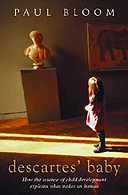
Descartes' Baby
by Paul Bloom
320pp, Heinemann, £20
Cartesian duality - that the soul and the body are separate entities - is deeply rooted in western culture. It articulates what appears to be a readily recognisable truth. I have a body, indeed I have a mind; but I experience my "self" as something distinct, connected with but at the same time independent of the sum of my parts.
Paul Bloom, professor of psychology at Yale, proposes biological foundations for our dualism. Research suggests that babies are equipped to function in two separate spheres, the material and the social. The brains of newborn infants are primed with an appreciation of the fundamental physical properties of objects. They also treat certain objects (faces and hands) entirely differently, understanding their movement and behaviour in terms of mental states - goals, drives, emotions - not physical laws. As children develop, experience and learning put culturally specific flesh on these bare bones, but from its earliest days the human brain is structured to perceive the world along dualistic lines.
There are other biases that appear to be hardwired, and Bloom examines several in his quest to dissect human nature. The common denominator is reproductive advantage: people whose brains work in these ways are ultimately more successful at raising offspring, hence these "adaptive" traits become disseminated in populations. Altruism and empathy, for example, have obvious implications for parenting. Adaptive traits may give rise to non-adaptive characteristics: Bloom invokes the concept of the expanding moral circle - in which empathy and altruism are extrapolated to ever wider constituencies through the interplay of language, intellect, and representation - to illustrate how such traits might give rise to justice and moral thought.
Bloom is optimistic about "moral progress". He accepts that in threatening circumstances moral circles contract, but insists that in modern societies "we are nicer to one another than we used to be". Even if one accepts his thesis, he is selective in the biological traits he considers. Male aggression and infidelity are adaptive traits with non-adaptive manifestations in warfare and in relationship breakdown.
Descartes' Baby frequently collides with the metaphysical. Our adaptive skills in categorisation and in "reading" other minds cause us constantly to see patterns and stories: we are prone to discern design and agency in an arbitrary world. Bloom argues that these non-adaptive traits explain our religious impulses.
Twenty-first century science will be dominated by the phenomena of consciousness and the self. Much is known already about the role of different areas of the brain in cognition, personality, emotion and behaviour. How objectively observable neuronal activity results in the subjective, self-conscious "I" remains a challenging problem, but Bloom states: "Modern science tells us that the conscious self arises from a purely physical brain. We do not have immaterial souls."
There is a contradiction that Bloom fails properly to highlight: brains exquisitely evolved to succeed in the material and social worlds are restricted in their conceptualisation. We understand matter and energy, but struggle to envisage quantum mechanical entities that are simultaneously both particles and waves. We think of things existing only if we can touch, see or otherwise physically locate them. Entities such as cultures - and perhaps selves - overspill the physical apparatuses that engender them. Bloom assumes a one-way street connecting biology and the social sphere. He contends that the structure of our brains makes us "natural-born dualists", yet this assertion takes no account of non-dualist traditions such as Buddhism which presumably modify what Bloom sees as a congenital disposition.
Science explains much about the universe, and will continue to evolve, but whether the conscious self has an existence beyond the demise of the brain that generates it is likely to remain a matter of faith. As Stephen Jay Gould observed, the domain of science is the empirical; questions as to ultimate meaning and moral value are spiritual. Bloom wilfully misinterprets the semantics of Gould's aphorism, a somewhat sour note at the end of an otherwise entertaining, fluent and provocative book.

